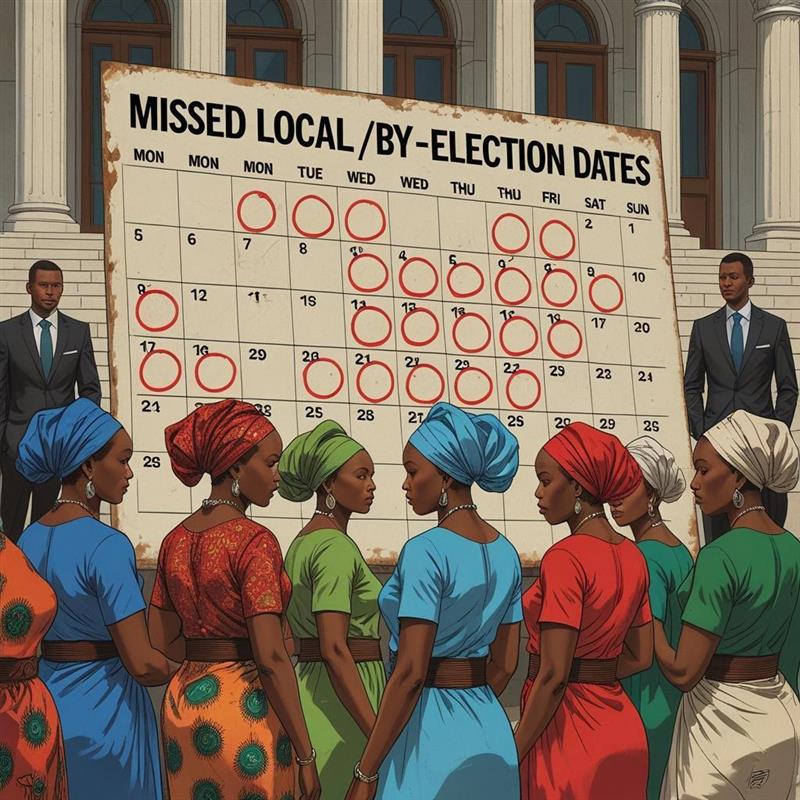The Missed Opportunities:
How focusing solely on major elections while ignoring bye-elections and local government polls is costing women decades of political progress
Thank you for subscribing
Thank you for subscribing
Thank you for subscribing

When Nigeria's Independent National Electoral Commission (INEC) announced 16 bye-elections scheduled for August 2025, affecting over 3.5 million voters across 12 states, the response from women's advocacy groups was predictably muted. No press releases demanding gender parity. No emergency meetings to identify potential women candidates. No mobilisation campaigns targeting these "smaller" elections. This silence represents one of the most costly strategic mistakes in Nigerian women's political advocacy, a pattern that has been repeated for decades and continues to undermine efforts to increase women's representation in government.
INEC's 2025 electoral calendar revealed the scope of missed opportunities:
- 16 bye-elections across 12 states (2 Senate seats, 5 House of Representatives seats, 9 state assembly seats)
- FCT Area Council elections, party primaries ended June 30, 2025
- Multiple state constituency elections affecting local governance across Nigeria
- Over 3.5 million registered voters participating in these "smaller" elections
Yet a review of major women's rights organisations' recent activities shows overwhelming focus on the Anambra gubernatorial election while these crucial pipeline positions remain largely ignored. Nigeria's women's advocacy landscape suffers from what could be called "big election syndrome"; the tendency to concentrate resources, attention, and mobilisation efforts on high-profile races while treating local government elections, bye-elections, and state assembly races as afterthoughts.
This approach might seem logical from a resource management perspective, but it fundamentally misunderstands how political careers are built and sustained in Nigeria.
Area councils and state assemblies are not consolation prizes, they are the launching pads for successful political careers. Nigeria's political elite understand this pipeline effect:
Local Government → State Assembly → Federal Positions → Executive Roles
When women's advocacy groups ignore these entry points, they are essentially conceding the future of women's political representation before the race even begins. Every bye-election that produces a male winner is a lost opportunity that compounds over time.
Consider the ripple effects:
- Immediate Impact: One more male voice in legislative chambers
- Medium-term Impact: Another male politician building experience and networks
- Long-term Impact: A future male candidate for higher office with an established track record
Multiply this by the hundreds of "smaller" elections held across Nigeria every electoral cycle, and the scale of missed opportunities becomes staggering.
INEC's announcement details bye-elections in constituencies including:
- Anambra South Senatorial District - A Senate seat with no visible women's advocacy mobilisation
- Onitsha North I State Constituency - A local assembly seat in a commercially vibrant area
- Five Federal Constituencies across multiple states - House of Representatives seats that could launch federal careers
Political party women leaders, who should serve as vigilant watchpersons ensuring women's participation across every elective position from area councils to federal seats, have largely failed to systematically monitor and mobilise for the pipeline elections that build sustainable political careers.
The Visibility Trap: Major elections generate media coverage and donor interest. This creates a feedback loop where advocacy groups chase visibility rather than impact.
Resource Scarcity Mindset: Organisations feel they must choose between supporting one high-profile candidate or spreading resources across multiple smaller races, ignoring the exponential returns of building a pipeline.
Donor Preferences: International donors prefer funding visible campaigns that generate measurable publicity. Supporting 20 area council candidates does not photograph as well as backing one gubernatorial candidate.
The ongoing gender inclusion bill presents a crucial opportunity to address these systemic challenges. The bill proposes mandating at least 35% of party leadership roles and appointed positions at federal and state levels be filled by women. This structural reform could create the accountability needed to ensure political party women leaders prioritise electoral engagement rather than focusing solely on high-profile races.
The bill's provisions for affirmative action in political appointments could also provide alternative pathways for women to gain political experience, complementing electoral strategies. However, without advocacy groups systematically contesting pipeline elections, even enhanced party leadership structures may struggle to identify experienced women candidates for higher offices.
Rwanda's Local Government Strategy: Rwanda's success in women's political representation began with systematic inclusion at local levels. Women's organisations focused on district and sector levels first, building experience and networks that transformed national politics.
Kenya's Bottom-Up Approach: Kenya's women's movement achieved gains by recognising that county assembly positions were the foundation for sustainable political advancement, creating the pipeline that now supplies women candidates for national positions.
Recommended Actions:
Coalition Building: Establish rapid-response coalitions to identify and support women candidates for unexpected electoral opportunities
Resource Reallocation: Shift at least 50% of electoral support resources from high-profile races to pipeline-building activities
Leverage the Gender Bill: Use proposed legislative frameworks to strengthen party-level accountability for women's participation across all electoral levels
The future of Nigerian women's political representation hangs in the balance, not in the governor's mansion, but in area council chambers, state assembly halls, and the bye-elections that nobody else is watching. The choice is clear: continue chasing headlines while conceding the pipeline, or pivot to the systematic work of building sustainable women's political power from the ground up.
Every day that passes without strategic focus on smaller elections is another day that Nigeria's political pipeline fills with male politicians who will dominate governance for decades to come. With the gender inclusion bill potentially providing structural support and the 2025 electoral calendar offering concrete opportunities, the time for strategic transformation is now!